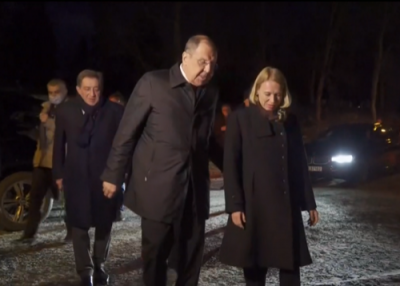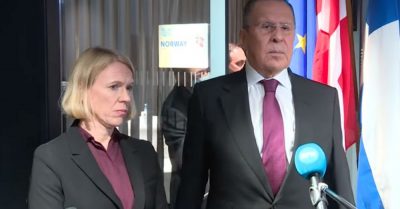Russia’s veteran foreign minister, Sergej Lavrov, paid a courtesy call to Oslo Tuesday evening to meet with Norway’s new prime minister, Jonas Gahr Støre. Lavrov also had a meeting Monday evening with new Norwegian Foreign Minister Anniken Huitfeldt, at a time when relations between Norway and Russia have been frosty at best.

Norway’s new Labour Party-led government has made the country’s northern areas a high priority again, and that’s where Norway and Russia have both the most in common and can be the most at odds.
There’s lots of “people-to-people” contact between Russians and Norwegians in the border area near Kirkenes, and there’s cooperation between the two countries within search and rescue operations and especially fishing in the Barents Sea. Norway and Russia even just agreed last week on a new fishing pact for 2022 aimed at managing and maintaining the world’s largest stocks of cod and other fish.
There were more friendly relations between Norway and Russia earlier this month when a new war memorial was unveiled on the island of Sørøya in Finnmark. Norway remains grateful for how Russia’s former Soviet Army played a critical role in the liberation of Northern Norway from Nazi German occupation towards the end of World War II. Newspaper Klassekampen reported how the new memorial highlights how the six victims of an American plane crash on Sørøya on June 17, 1944 were actually Soviet soldiers. They were wearing American military uniforms and flying a US Catalina aircraft because they’d been trained in the US, which had lent the aircraft to the Soviet Union to help them fight Hitler.
The memorial, according to former Defense Minister Frank Bakke-Jensen who met with both Russiand and US officials at the site, “tells the story about how two neighbouring countries (Norway and Russia) and their allies cooperated to defeat the Nazis and facism. I’m very glad we can meet.” He added that such memorials to the liberation “are important meeting points between our two countries,” while the ongoing “people-to-people contact can reduce the chilly relations between the neighbours at this time.”
Cooperation despite conflicts
Huitfeldt and Støre of the Labour Party also claim they want to improve relations with Russia, but conflicts have risen again lately and tensions were evident around Huitfeldt’s meeting with Lavrov Monday evening. It occurred in connection with Norway’s hosting of the Barents Council meeting in Tromsø on Tuesday and also began with another joint visit to a memorial to Soviet soldiers who died on Norwegian soil during World War II. Norwegian Broadcasting (NRK) reported how both Lavrov, who’s been Russia’s foreign minister for 17 years, and Huitfeldt, who’s been Norway’s foreign minister for 11 days, greeted each other with big smiles and a long and firm handshake.
Their meeting continued behind closed doors, where several topics were taken up, some of them clearly difficult. “We had a good and open discussion,” Huitfeldt said, about issues “on which we agree and disagree.” She added that both she and Lavrov “look forward to borders opening up again (when the Corona crisis subsides sufficiently) so that we can meet each other.” Lavrov also issued the invitation for Huitfeldt to visit Moscow that Norway clearly wanted.

But Huitfeldt, who headed the Norwegian Parliament’s foreign relations and defense committee for several years before becoming foreign minister, said she “of course” expressed that Norway is “deeply concerned about the human rights situation in Russia.” She said the two disagreed on various security issues, not surprisingly after a week in which newspaper Dagens Næringsliv (DN) has reported extensively on suspicions that Russian research- and offshore service vessels operating in Norwegian waters are really spying ships in disguise, keen on gaining information about Norway’s offshore infrastructure. Norway and several other fellow members of NATO maintain that they’ve also been subject to lengthy and aggressive espionage operations from Russia as well as suspected Russian hacking and interference via social media.
Lavrov, meanwhile, told reporters that “Norway is a member of NATO. NATO is no friend of Russia. They have decided not to be friendly. They call Russia and China a threat against NATO. My good friend Jens Stoltenberg (NATO’s secretary general who’s also a former Norwegian prime minister) now says that NATO must be responsibile for security in the whole world.”
There’s also been a lot of drama between NATO and Russia lately, after NATO ejected some suspected Russian spies and Russia responded by calling home all its representatives in Brussels and broke off diplomatic contact with NATO.
The session between Lavrov and Huitfeldt was portrayed as civil, however, and Huitfeldt had told NRK before their meeting that “at a time of increased tensions, it’s important to have even more opportunities to contribute to dialogue and some calm.” Russian officials were taking part in the Barents Council’s meeting this week, which also includes officials from all the countries in the Barents region.
Council officials are also glad that the new government’s platform specifically states that it wants more international cooperation in the northern areas and the Barents region. “This is the starting point,” Lars Georg Fordal, leader of the Barents Secretariat, told NRK.
(For more on the Barents Council’s meeting in Tromsø this week, click to the Barents Observer, which covers issues in the region in English).
Then Lavrov headed to Oslo for a quick meeting Tuesday evening with the new Norwegian Prime Minister Støre, who served for six years as foreign minister under Stoltenberg. Both quickly found some common ground. The European Union (EU) has been claiming that it wants to stop all oil exploration and eventually oil production in the Arctic. Both Lavrov and Støre agreed that a full stop is not a good means of trying to halt climate change.

Both countries are oil and gas producers, with their respective oil and gas industries making important contributions to both their economies. Støre campaigned for his prime minister’s post on a platform of “developing, not phasing out” the oil industry. He claims the oil industry’s competence and capital is needed to make the eventual transition to a greener economy, and phasing it out would be counterproductive.
“I agree with that opinion that Norway’s prime minister Jonas Gahr Støre has expresssed,” Lavrov told NRK Tuesday evening. Both Norway and Russia are also major suppliers of gas to Europe, which has been especially needed lately as electricity rates skyrocket. Lavrov said he thinks the European continent would struggle without its Norwegian and Russian gas supplies and, in turn, its efforts to meet its own climate goals, since gas can replace the coal that’s still used as an energy source in Europe.

Relations between Norway and Russia remain strained, though, despite the meetings with Lavrov this week. Norway continues to support the sanctions imposed against Russia after its annexation of Crimea in 2014. Huitfeldt has expressed that its foreign policy towards Russia will remain “firm and predictable. We are transparent, we can be relied upon. They know where they have us.” She said the new government, in which she plays an important role, will take Norway in some new directions, “but the main lines remain firm. That’s what’s most important for me to communicate to the Russian foreign minister.”
newsinenglish.no/Nina Berglund

